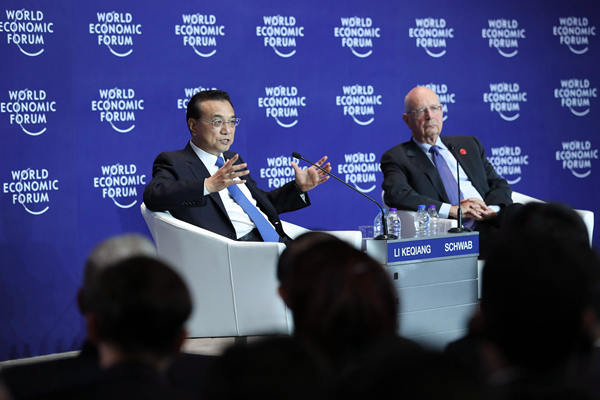China's reform welcomes foreign participation: Premier Li
China's reform needs the participation of foreign capital, companies and wisdom, Premier Li Keqiang said on June 28, pledging easier market access and a level playing field.
|
|
|
Premier Li Keqiang meets with entrepreneurs and professionals from business, finance, media and think tanks who are attending Summer Davos on June 28. The 2017 Summer Davos Forum is being held in Dalian, a coastal city of Northeast China’s Liaoning province, from June 27 to 29. [Photo/Xinhua] |
The premier made the remarks when answering a question from Dutch multinational Royal DSM CEO Feike Sijbesma in a meeting with global business leaders at the ongoing Annual Meeting of the New Champions 2017, or Summer Davos, in Dalian.
"China's reform has always paralleled with the opening up [...] We welcome foreign firms to come to China and participate in corporate reorganization and will further lower the threshold of services to foster new growth engines," Li said.
Li also promised that overseas companies will enjoy the same treatment as domestic firms.
"China welcomes Royal DSM to increase investment here," he said.
China remains an attractive destination for foreign investors. Foreign direct investment on the Chinese mainland maintained steady growth of 4.1 percent year on year in 2016 with strong investment in the service sector.
When answering a question from Alex Molinaroli, chairman and CEO of Johnson Controls, the premier reassured global companies that the country' s manufacturing improvement program will not lead to a worsening business environment.
"There is a misunderstanding about the 'Made in China 2025' plan, saying the purpose of such policies is to enable China not to buy foreign equipment, which, however, is impossible," Li said, pointing out that firms make their own decisions to purchase products in the age of globalization.
Instead, "it will create enormous business opportunity for companies from home and abroad," Li said.
He said he expected more technological cooperation between domestic firms and their global peers and more manufacturing products into the Chinese market.
With huge market potential, the improvements of China's manufacturing will in return prompt the growth of the world market, Li said.
Responding to concerns on forced technology transfers, Li said: "The government will not allow Chinese companies to compel foreign partners to transfer technologies or infringe on intellectual property rights [...] cooperation should be voluntary and to the benefit of exploring the Chinese market."
Li promised equal support for foreign-funded companies in areas related to the plan, such as green development.
